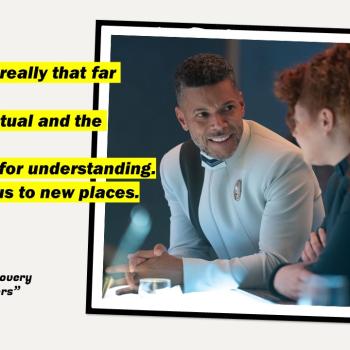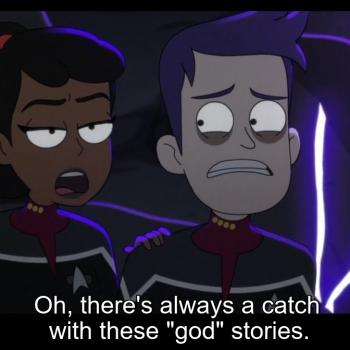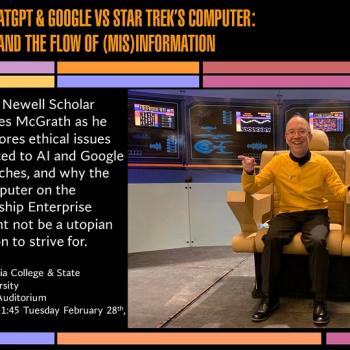I recently rewatched Star Trek VI: The Undiscovered Country. There is a running joke throughout the movie that actually is fundamental to its point. Spock quotes ‘an old Vulcan proverb,’ “Only Nixon could go to China.” There is discussion of Shakespeare in the original Klingon. And Chekov makes reference to the Russian epic of Cinderella. But in fact, what initially struck me as mere attempts at humor are in fact central to its message (and woven into the soundtrack in ways I hadn’t perceived – see the interview below for more on that). The cultures that we are so proud of, leading us to hate others or at least think ourselves superior, are not hermetically sealed. Even if we are separated from them by a neutral zone, ideas and language seep through. The movie is thus relevant to an era of increasing tension between identities, cultures, and nations, and concerns about cultural appropriation.
There’s more about or relevant to religion in the movie than I remembered, and this ties in with the central theme. Spock has a famous Marc Chagall painting depicting the expulsion of Adam and Even from paradise in his quarters. He refers to it as a scene from ancient earth mythology, which he has there as a reminder that all things end. In explaining this to another Vulcan, he says she must have faith that the universe will unfold as it should, and that logic is the beginning of wisdom, not the end. He has learned from humans without ceasing to be Vulcan, and thus works for peace while the other Vulcan we later learn conspires to prevent a move in the direction of risky change.
The movie’s message is of course shaped and framed by the fact that the Next Generation had already shown Worf on the bridge of the Enterprise and Klingons as serving in Starfleet. (His grandfather, also played by Michael Dorn and named Worf, appears in the movie.)
The movie focuses attention on those who stand in the situation of greatest power and privilege, the United Federation of Planets standing in for the United States. Our language of “inalienable” rights and “human” rights is racist, it is suggested, and so even our verbiage that claims to welcome others and be inclusive can serve to reinforce our own dominance. It is one thing to welcome others to become perpetual guests in our mansion. It is quite another to share our privilege with them.
The concerns of Klingons at the situation and how it might lead to the destruction of their culture is expressed in terms that echo (as Kirk points out) “Earth, Hitler, 1938.” In view of what we’ve said thus far, perhaps one message of the film is that our cultures blur into and are influenced by others whether we are in a place of dominance or subjugation, and so protecting our heritage from being changes is a fool’s errand.
It is also worth highlighting the disadvantages of privilege such as the United States has had in recent history. Humans in the film are monolingual while the Klingons are fluent in English. McCoy doesn’t know Klingon anatomy. When Kirk’s universal translator is confiscated he is unable to manage.
Kirk says to Spock that they are both extremists while reality is probably somewhere in between. That’s part of the film’s message too, as I’ve already hinted at. We can cherish distinctive traditions in a manner that recognizes that no one genuinely owns culture. We can learn to share in ways that do not seek to control and dominate what we never can really hope to. And we can learn to laugh at ourselves in ways that are essential to learning another language or navigating cultural differences. It is thus fitting that towards the end we get one last humorous exchange on this topic, in which Kirk tells Spock that “Everybody’s human.” Spock replies, “I find that remark…insulting.” And in the end the language of the original series is updated into the form it takes in the Next Generation and beyond. “…to boldly go where no man…no one…has gone before.”
As I hinted at above, the score by Cliff Eidelman is one that I’ve loved for a long time. But I recently found this interview with the composer, and learned some things that show how the music reinforces the major themes of the film in ways that I hadn’t realized before. Watch it and you’ll see how it connects with the themes I’ve been discussing here.
What older movie(s) have you rewatched recently and found it to be a rewarding experience doing so? Having also rewatched Star Trek V recently, the treatment of Klingons in VI is refreshing, if it doesn’t entirely make up for the way they are depicted in V.














